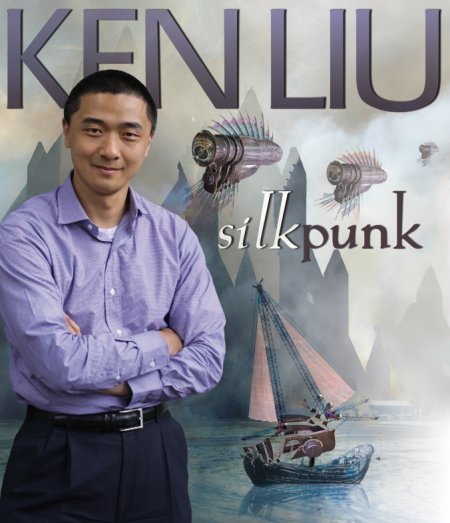Ken Liu: Silkpunk
 Ken Liu (Liu Yukun) was born in 1976 in Lanzhou China. He moved to the US with his family when he was 11 years old, first living in Palo Alto CA before moving to Waterford CT. He was an English major at Harvard, and after graduation worked in technology for several years, including time at Microsoft as an engineer and working for a startup in Cambridge. He attended Harvard Law School, and now works as a litigation consultant.
Ken Liu (Liu Yukun) was born in 1976 in Lanzhou China. He moved to the US with his family when he was 11 years old, first living in Palo Alto CA before moving to Waterford CT. He was an English major at Harvard, and after graduation worked in technology for several years, including time at Microsoft as an engineer and working for a startup in Cambridge. He attended Harvard Law School, and now works as a litigation consultant.
His first story ‘‘The Carthaginian Rose’’ appeared in 2002, and while he published a handful of stories in the following years, he began to publish more widely and rise to greater prominence around 2010, with scores of stories appearing in the past five years, including major award winners. Story ‘‘The Paper Menagerie’’ (2011) won the Hugo, World Fantasy, and Nebula Awards, and ‘‘Mono no Aware’’ (2012) won a Hugo Award. Other notable short works include Hugo, Sturgeon Memorial, and Nebula Award finalist ‘‘The Man Who Ended History: A Documentary’’ (2011); Sturgeon and Nebula Award nominee ‘‘The Bookmaking Habits of Select Species’’ (2012); and Nebula Award finalists ‘‘The Waves’’ (2012), ‘‘All the Flavors’’ (2012), and ‘‘The Litigation Master and the Monkey King’’ (2013); Sidewise Award finalist ‘‘A Brief History of the Trans-Pacific Tunnel’’ (2013); and WSFA Small Press Award winner ‘‘Good Hunting’’ (2012).
Liu is also a prolific translator of Chinese SF, including SF&F Translation Award winner ‘‘The Fish of Lijiang’’ by Chen Qiufan (2011) and Hugo and Nebula Award-nominated novel The Three-Body Problem by Cixin Liu (2014).
Debut novel The Grace of Kings (2015) begins the ‘‘silkpunk’’ epic fantasy Dandelion Dynasty series, combining elements of traditional Chinese storytelling and Western epic traditions.
Liu lives in Massachusetts with his wife, Lisa Tang Liu, and their two children.
Excerpts from the interview:
‘‘I think any story that writers tell about how they came to the genre is likely a lie to some degree. I believe these origin stories are retroactive, neat reconstructions that leave out the randomness of actual experience. They’re instructive because the stories we tell about our own lives are revealing. They’re not ‘the truth.’ I can tell you my story, and it’s true in a sense, but that’s not the same as factual.
‘‘I think I got into writing because I like telling stories. When I was little, my grandmother told me stories she made up, and I liked making up new stories for my friends in class. These stories usually involved changing a classic story in some way that I thought made it better. Even in that experience, I guess you could find a trace of what drew me to science fiction and fantasy: I wanted stories that were improved by speculation.
‘‘I’m writing novels now, trying to expand my creative approach to a longer format. Novels require a lot more planning and concentration than short stories. When I was trying to go from short stories to novels, the biggest trouble I had was with basic recordkeeping. A short story is like sculpting: you can keep the whole thing in your head and chip away at it. Novels feel more like architecture, with a grand structure and thousands of decisions to be made at every level. I started to keep a wiki to record the details about the world. Small decisions you make early on can have repercussions long down the road, so you have to track everything.”
…
‘‘The idea of silkpunk is to rely on organic building materials, material of historic importance to East Asia, but also materials of importance to seafaring cultures of the Pacific. Bamboo, silk, ox sinew, coconut, coral, feathers, things like that. All the machines are designed around principles based on biomechanics. For example, the airships in my novel are made of bamboo and silk, and they are not propelled forward by rotating propellers but by giant feathered oars. The lift gas bags expand and contract in the same way that a fish’s swim bladder does to increase and decrease buoyancy. There are other inventions based around this vocabulary that I think people will like. It’s a new look. It’s not a look derived from Chinese history. I wanted to create a look specifically inspired by East Asia, but that isn’t East Asian.”
‘‘I did not want to write a magical China story. I think magical China stories are difficult to do well, and even then they cannot escape the problem of the colonial gaze. China has been so steeped, since the days of Marco Polo, in a very exoticizing and subjugating gaze by the West, that it’s not possible to tell a story about China without invoking layers of Orientalism and colonialism. It’s in the very nature of the vocabulary used to describe China-related concepts. For example, the very important Chinese mythical creatures, dragon and phoenix, shouldn’t be called ‘dragon’ and ‘phoenix’ at all. The Chinese Long and Fenghuang have nothing to do with the Western creatures they are ‘translated’ into. The only reason they’re called that is because early missionaries got to China and saw these creatures, and, knowing nothing about their history and their meaning to the people, gave them the same names as similar-looking Western creatures. That means these creatures are being framed with a set of associations and meanings that have no justification in terms of Chinese culture. The dragon in the West is the wyrm, the devil’s creature, a demonic thing, and it breathes fire. None of these things apply to the Chinese dragon because it’s not a dragon at all. The dragon there is derived from Buddhism as well as native Chinese mythical influences. The Chinese fire bird also has very little to do with the Western concept of the phoenix. It’s impossible to write ‘‘magical China’’ without evoking these wrongful associations. Rather than struggling against that, I decided to create a secondary fantasy world that’s inspired by East Asia. I created an archipelago that’s as different from continental China as possible, and I created new cultures, new histories, new peoples. There are sometimes analogues to the original concepts, but they’re not exact ‘translations.’ That way a reader won’t fall into a trap of easily reading this story as tapping into that set of associated, accumulated layers of Orientalism that I’m trying to avoid. If I don’t do it that way, I think people will read it and start thinking, ‘This is like a samurai; this is like a courtesan; this is like a geisha.’ I don’t want that. This attempt to avoid the Orientalizing risk carries through in terms of the narrative techniques I use.
‘‘The Grace of Kings is written in a mixture of narrative techniques that I invented just for the novel. It uses a lot of techniques derived from Chinese oral storytelling techniques that I’m very familiar with, because I grew up listening to these stories. The way characters are introduced imitates classic Ming dynasty novels. There are characterization techniques taken from wuxia novels. At the same time, I deliberately wanted to make comparisons and evoke for readers the feeling of the other epic traditions. So there are tropes and narrative techniques taken from The Iliad, and The Odyssey, and Paradise Lost. There are Anglo-Saxon style kennings, for example, and catalogs like in oral epics. It is a deliberate melding of epic techniques and traditions. The hope is that it will feel to the reader like something both familiar and strange at the same time.”
…
‘‘The next book will have some of the same characters and some new ones. It will happen some time after the first book’s ending. It’s not like everybody has died of old age and you have new characters coming onto the scene, but it’s also not like it’s the next day. It’s somewhere in between. The way I plotted these three books is that there is going to be an overall arc, or set of arcs, that will be resolved in the series. I tried to write the books so they’re each somewhat self-contained, and they also form an arc, more like the Dune series, as opposed to writing the trilogy as if it’s one book. This is not like The Lord of the Rings, where the books are one book that happened to be published in three pieces. My books are written separately. They have an arc that connects them. There is a rough draft of the second book but it’s not finished. There’s a lot more work to be done.”
…
“I’ve done a lot of studying and thinking about translation in general. In particular for The Three Body Problem, there are a lot of complications in the translation process. People give translators too little credit and too much credit at the same time. If you’re going to give the translator credit for doing something well, you also need to blame them for everything that’s not good in the book, and that doesn’t seem right in either case. I don’t think the translator should ‘improve’ the work beyond what it is. I know that a lot of people disagree with me, but that’s my belief.
‘‘One of the things that surprised a lot of American readers is the fact that The Three-Body Problem being translated into English and then nominated for a Nebula Award was such a huge deal in China. It’s inconceivable for readers here. Some reporters asked me, ‘Why are Chinese readers so excited about the Nebula Award? American fans wouldn’t be so excited if one of their books was translated into Chinese and won some award.’ I said, ‘You wouldn’t care. You’re coming from the modern Rome, the core of world culture, whereas China is at the periphery. For Chinese fans, something they love in their language is being recognized by readers in America, who are perceived as the prestige readers.’ One of the aspects of being from a prestigious culture is that you don’t necessarily perceive yourself as having power.”
…
‘‘Joshua Rothman from the New Yorker wrote a profile about Liu Cixin recently. He said one of the interesting things about American science fiction versus Chinese science fiction is that a lot of American science fiction is consciously or unconsciously reflecting on our own history. There’s a large concern about the frontier, and developing the frontier, which is reflective of our own experience with the frontier. There are also a lot of concerns about problems of democratic governance and how to develop a society based on the Constitution, and all these problems based on very American political and historical experiences. He says that’s natural, and that’s what you’d expect – we’re the American people and that’s our history. When we imagine the future, these things come through. What’s interesting about looking at another culture’s science fiction is that you see different experiences reflected. What I’m hoping is that by seeing more of Chinese science fiction published in English, people can get a sense of what Chinese writers, people who are steeped in postcolonialism, a cosmopolitan mix of native and Western influences, and the tumultuous experiences of the 20th century, what sort of concerns are reflected in their writing, and what kind of lessons those can teach us. That’s one of the things that The Three Body Problem and its sequels consider. They talk about the idea of first contact and aliens from a new perspective.’’
Read the complete interview in the May 2015 issue of Locus Magazine. Interview design by Francesca Myman.






I respectfully disagree with Liu’s opinion that being nominated for an award in China wouldn’t be perceived as prestigious for a Western author. As an aspiring writer myself, i’ve always have been interested in the international markets as well as those in the US for potential readers. And if i was (some how) nominated for an award i’d be extremely pleased and honored because it would show that my work would appeal to more than just one point of view and not be contained into any cultural bias.
To my understanding, the person who asked this question to Liu is suggesting that a sf fan from the US might not necessarily be as excited if a sf novel from the US were nominated for an award in China (or anywhere else in the non-Western world for that matter). This is because Western (and North American) culture dominates the global market, and it is very common to see books from the US nominated for awards worldwide. Also, people from the US internalize the fact that they are at the center of the global culture, so they do not feel the need to see that their culture or cultural products of their country are recognized internationally to feel proud. I believe it goes without saying that individual authors would, of course, feel honored if their book were nominated for an award, regardless of the country of origin of the award, but here the interviewer and Liu are talking about the fan response. So, Chinese sf fans may feel much more enthusiastic and validated (compared to their US counterpart) when they see books and authors from their country being nominated for international awards. There was also no no precedent of this (in sf) before Liu Cixin’s Three-Body Problem, so that is also why there was a big reaction. Conversely, the same situation may not evoke the same level of excitement from the US fans since US culture, literature, movies, etc., are already at the center of mainstream culture internationally.